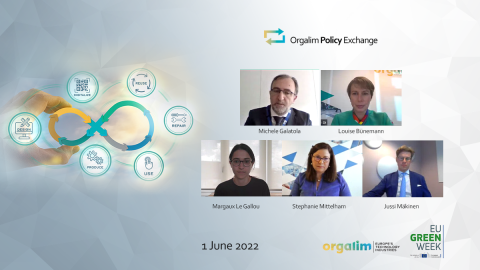Making the most of the proposed Ecodesign for Sustainable Products Regulation
3 June 2022

"In Europe, still too many resources are wasted, not recycled or kept in the cycle. And this is of course leading to other problems, such as material and energy dependency" – the words of Michele Galatola, Policy Officer at European Commission DG GROW, in his keynote speech. To tackle this issue, on 30 March 2022 the European Commission proposed a new Ecodesign for Sustainable Products Regulation with the objective of making sustainable products the norm.
Orgalim’s latest Policy Exchange, joined by more than 400 participants, took a close look at the implications of the proposed Regulation – which will impact "not only the industry, but also society in general", as emphasised by the moderator Stéphanie Mittelham, Manager Energy and Environment at Orgalim, Europe’s Technology Industries.
An ambitious plan
The new ESPR Proposal builds on the existing Ecodesign Directive but is wider in scope –moving beyond energy-related products and impacting the entire supply chain. As confirmed by Mr Galatola, "To further improve circularity, the Proposal will also make a clear link between environmental performance of products and public procurement as well as include specific requirements to prevent the destruction of unsold consumer goods". The importance of improving circularity was stressed by all the speakers. "We support the principles of the Regulation and welcome the ambition of improving circular economy. Our industries stand ready to deliver our expertise", said Louise Bünemann, Chair of the Orgalim Environmental Sustainability Working Group and Head of EU Environmental Policy at the Confederation of Danish Industries.
The biggest change is probably the new Digital Product Passport, which will provide data on a product along its value chain. "It will allow consumers to have access to information specifically relevant to them, allowing them to choose products that are more in line with their values", said Mr Galatola.
In Europe, still too many resources are wasted, not recycled or kept in the cycle. And this is of course leading to other problems, such as material and energy dependency.
How can we get it right?
All speakers agreed on the pivotal importance of the ESPR Proposal. However they raised some areas of concern, notably for the implementation of the Digital Product Passport. "While our industries definitely support transparency and easier access to data, we are also worried that we might unwillingly deliver some confidential business data and trade secrets to our competitors", said Ms Bünemann. The extra administrative burden is also a cause of concern: "We do worry about double regulation, duplication of efforts in providing information and third-party verification" she added.
Jussi Mäkinen, Director EU Regulation at Technology Industries of Finland, shared these concerns and further emphasised the importance of transparency and standardisation in the Regulation. "We need some ground rules and clear and reliable standards for everyone; and those standards should have an international character wherever possible."
For Margaux Le Gallou, Programme Manager at the NGO ECOS, the success of the Regulation will mainly depend on two factors: first, the level of ambition in the Delegated Acts, and second, the timeframe for adopting these Delegated Acts. Ms Le Gallou also pointed out the missed opportunity of not including construction products in the scope of the Regulation and reminded us that "while we very much welcome the ambitious information requirements for the Digital Product Passport, they should not replace on-product information. Legal information must be clearly differentiated from marketing messages and must be accessible."
The session closed with a Q&A round, and an exchange of ideas among panellists which helped to deepen understanding of the impact of the proposed Regulation.
Read Orgalim position and recommendations on the proposed Ecodesign for Sustainable Products Regulation in full here and download a copy of the presentation slides here. A summary of the Q&A is also available.
In case you missed this debate, you can watch a replay of the session below or by clicking here.
And keep abreast of the latest news by subscribing to our newsletter!

LATEST NEWS
How can we create a dynamic, competitive European high-tech manufacturing base?
Orgalim's key recommendations offer policymake...
